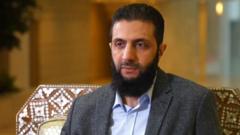In an exclusive interview with the BBC in Damascus, Ahmed al-Sharaa, the prominent rebel leader and head of Hayat Tahrir al-Sham (HTS), articulated that Syria is currently too exhausted from years of civil war to be considered a threat to its neighboring countries or to the Western world. He called for an immediate lifting of sanctions, positing that these restrictions were implemented specifically to target the previous regime of Bashar al-Assad and should not be levied against the victims of war.
In a remarkable turn of events, Sharaa led a swift military offensive that resulted in the overthrow of Assad's government just weeks ago. Aiming to reshape the narrative surrounding the HTS, Sharaa insisted that the group should be reclassified and removed from lists of terrorist organizations, as designated by entities such as the UN, US, EU, and UK following its origins as an offshoot of al-Qaeda. He emphasized that HTS does not engage in anti-civilian actions and views itself as a victim of the oppressive Assad regime.
Distant from intentions to model Syria after Afghanistan, Sharaa emphasized the distinct cultural and societal structures of Syria, pointing out his commitment to women's education and the advancements made in the northwest province of Idlib, where over 60% of university students are female. When questioned on various social norms, specifically alcohol consumption, he maintained that these legal matters should be discussed by a Syrian assembly of legal experts that will undertake the drafting of a new constitution, ensuring that any leader or government must adhere to the law.
Throughout the interview, Sharaa remained composed, wearing civilian attire, and attempted to alleviate concerns regarding HTS's previous reputation. However, skepticism persist among the Syrian populace regarding whether the new leadership can truly separate itself from its radical past. The forthcoming actions of Syria’s emerging rulers will be pivotal in determining the country's identity and governance structure in the aftermath of conflict.




















